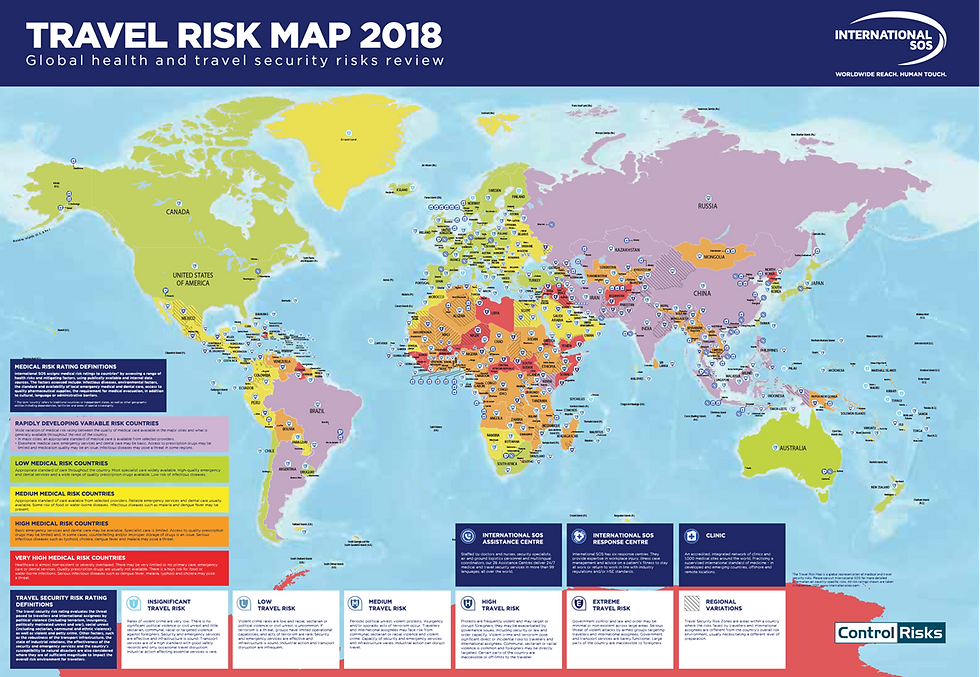THEY WENT IN DANGEROUS COUNTRIES FOR HOLIDAYS
- 13 déc. 2017
- 3 min de lecture

The Travel Risk Map 2018 came out last month and the number of tourists going in red and orange zone countries had increased these last ten years. Indeed, according to The Data World Bank, in 2015, there were 61 000 tourists that came to Iraq. Zameer Hussein, Secondary School Teacher in the UK said: “Iraq is my favorite destination in the world due to the generosity of the people and the spiritual atmosphere of the pilgrimage.“ Iraq is considered as a red zone county by UK government which mean that Iraq is really dangerous for tourists. The ranking is made after several criteria as terrorism and crime rate.
WHY RISKING THEIR LIVES?
The trend of the backpack traveler is leading more and more people to travel to risked countries. However, Bassem Tabet, expert of Lebanon geopolitics, explains that the risks are real. “The Syrian Crisis brought 1 million refugees on 4 million Lebanese. Moreover, the situation between Israël and the Hezbollah seriously increase violence. Finally, Lebanon is a country composed of 17 different religious communities on a territory equal to half of Belgium, which create high tensions between the different religious group and afterward on the Lebanese people.“ Some tourist is conscious of the risk but does not feel the insecurity as Julien Estephan, Franco-Lebanese that go often in Lebanon “I never felt insecure. People are leaving well this situation.“ He also explains that even if he feels safe he once lived a choking event. “Once, there was a trapped car at 500m from my place. There were no injuries or died but I realized the tension between communities in Lebanon was a danger for all of us.“ Adib Mhibik, French Duty-Free trainer in Saudi Arabia, lived a similar experience “Two weeks ago a Yemeni missile explode in the sky at 15 minutes from my place. We don’t know what can happen, this missile made 800 kilometers to kill, so yes I am worried.“
Zameer Hussein went three times to Iraq for pilgrimage which is always his main motivation. Despite that, he realizes that the country can be dangerous especially as a Shia Muslim in a country threated by ISIS. “When traveling to the city of Samarra, near Baghdad, we had to drive past Tikrit, which was occupied by ISIS at the time. We were told that if we make one wrong turn in that area, the inhabitants would inform ISIS commanders to take us. We had to ensure our curtains on the coach were drawn so that we are not seen as pilgrims. However, when we got the shrine, it was safe due to the Iraqi army being there to escort us.“
CLICHÉS VS. REALITY

However, the countries ranked in the orange and red zone also suffer from a lot of clichés that often revealed completely false. Adib Mhibik had a lot of clichés. “I thought relationships between men and women as friendship or even at work or in the street will be really complicated. The Saudi law forbids relationships between men and women outside of family or work. I was scared to say “Thanks“ if a woman holds me the door outside of work, and to do something illegal. But these clichés were false. I can speak to women everywhere, I can joke with them the only restriction is that we have to stay in a muslin respectful context.“ He also adds that Saudi Arabia is on the way to change. Nowadays, they respect Sharia Law which is really strict but each day he sees that the new generation will be freer as the Prince Salmane Ben Saoud, the future king wants an Islam more moderate. “The moment that I remember the most was the National Party in September. It’s an outside party organized on the Saudi 5th avenue, Tahlia Street, with techno music. The best was that men and women were dancing together, mixed without the religious police Mutawa doing anything. It was amazing to see this new Saudi generation expressed. Zameer Hussain also had a lot of cliché toward Iraq, he though ISIS and bombs were everywhere. “This was not true; only Northern Iraq had problems.“ For Bassem Tabet, Lebanon also suffers from unjustified clichés “There were more died in terrorist attacks in Paris these last two years than in Beyrouth. Moreover, people can walk in the street at night everywhere in Beyrout without dangers, I will not say the same about London.“
When we ask these people about their memories, they first talk about all the best they learned from these incredible experiences. Maureen Giroud, who lived three years in Djibouti said “Despite some complicated moment, I have a lot of good memories. I see the world differently now, this country made me grow as a person.“
















Commentaires